calsfoundation@cals.org
Dick Powell (1904–1963)
aka: Richard Ewing Powell
Richard Ewing Powell was a musician, actor, and director. An ambitious man always pursuing new avenues for his creativity, Powell experimented with different media (radio, film, and television) at a time when not many did. The films of which he was a part ranged from 1930s comical musicals to 1940s films noir.
Dick Powell was born in Mountain View (Stone County) on November 14, 1904, the second of three sons of Sallie Thompson and Ewing Powell. His father was a machinery salesman sometimes credited with introducing the gasoline engine to north Arkansas. Powell’s mother encouraged her three sons’ interest in music.
His most important early musical influence was George R. “Dick” Case, a Mountain View merchant for whom he was named. Case owned one of the few pianos in town, and the instrument greatly fascinated Powell. Although Case could only pick out simple tunes with one finger, he nevertheless was able to teach Powell the rudiments of music. Powell learned his first songs by insisting that Case play a tune until he memorized the piece and could hum it. Powell then would head home and sing the new addition to his repertoire for anyone who would listen.
At age five, in 1909, Powell made his formal singing debut, performing “Casey Jones” (then a new song) for a local audience. In 1912, the family moved to Berryville (Carroll County), where eight-year-old Powell learned to play the piano. The family moved to Little Rock (Pulaski County) in 1914, where Powell became quite active musically. He sang at various churches and the Masonic lodge, generally receiving the then very respectable sum of ten to fifteen dollars for his efforts. He also sang in high school productions and learned to play several instruments such as the cornet, clarinet, and saxophone. While attending Little Rock Junior College (now the University of Arkansas at Little Rock), he organized a dance band called the Peter Pan, but he mainly paid his way through college with non-musical work as a soda jerk, grocery store clerk, and worker at a telephone company. After graduation, he married his long-time sweetheart, Mildred Maund, who strongly disapproved of her husband’s show business aspirations, a situation that led to the couple’s divorce in 1927. Powell married twice more, both times to actresses. His marriage to Joan Blondell on September 19, 1936, ended in 1944, but his marriage to June Allyson on August 19, 1945, lasted until Powell’s death.
In 1925, Powell toured with the Royal Peacocks, a dance band based in Louisville, Kentucky, that played throughout the Midwest. When this group disbanded, he worked as banjoist and vocalist for the Charles Davis Orchestra in Indianapolis, Indiana. His first commercial recordings were made with this band for the Gennett company. Powell’s “Is She My Girl Friend?” and “Beautiful” were released in December 1927 on the Vocalion label.
After a year with the Charles Davis Orchestra, Powell decided to try his luck on his own as a singer. A few months later, he returned to Davis’s band, which was now performing at major movie houses. This time, in addition to his other duties, he was called upon to act as a master of ceremonies in the days when the screen was accompanied by a stage and an emcee to provide some comic relief. He enjoyed the job, which ultimately led to his entry into motion pictures. Because of his successful work in Indianapolis as an emcee, he was offered a job with the Enright Theatre in Pittsburgh, Pennsylvania. A few months later, he was with the more prestigious Stanley Theatre, part of the Warner Brothers chain, which was also in Pittsburgh.
As a result of this connection, Powell received offers to appear in motion pictures. Although he had no particular interest in being an actor, Powell decided to take a chance on films. He tested for a part in a movie tentatively titled Crooner, and though he did not get the part, he impressed the studio enough that it gave him a contract. Screen stardom did not come until his fifth film, 42nd Street (1933). In 1935 and 1936, he had a movie ranked in the box office top ten.
Despite great success in musical roles, by the late 1930s, Powell was eager to try non-musical fare and moved from Warner Brothers to Paramount to RKO in an effort to change his screen image. At RKO, he achieved his goal with his portrayal of hard-boiled detective Philip Marlowe in Farewell, My Lovely (1945). Ironically, Powell’s last film role, in Susan Slept Here (1954), was very similar to the frivolous parts he had tried to get away from in the 1930s. He then went on to primarily directing films, such as The Enemy Below (1957) and The Hunters (1958). Powell’s last involvement with film was as narrator of the documentary Cargo and Capital (1961).
Powell was also active in radio and television after his success in the movies, serving as host of Hollywood Hotel (1934–1938), the first significant national radio program to be aired from the West Coast. He also appeared on television in Four Star Playhouse (1952–1956), which presented 129 dramatic presentations during its four years on air. Powell formed Four Star Productions with Charles Boyer, Joel McCrae, and Rosalind Russell; when McCrae and Russell dropped out, David Niven joined the company. Powell was the company’s driving force, and it gained success with The Rifleman. From 1961 to 1963, Powell hosted and occasionally starred in the TV show The Dick Powell Show (later renamed The Dick Powell Theatre).
On January 2, 1963, Powell died of cancer at the age of fifty-eight. He is buried at Forest Lawn Memorial Park in Glendale, California.
For additional information:
“Dick Powell.” Internet Movie Database. http://www.imdb.com/name/nm0694090/ (accessed August 17, 2023).
Leus, Christian. “Hope and the Watermelon: Dick Powell and the Seeds of Hollywood in 1930s Arkansas.” Arkansas Life, February 2019, pp. 30–35.
Marsh, John L. “Dick Powell: Out Algering Horatio Alger.” Arkansas Historical Quarterly 43 (Autumn 1984): 244–262.
McNeil, W. K., and Louis Hatchett. Dick Powell: A Bio-Discography. Portland, OR: The Joyce Record Club, 2000.
Pendarvis, Jack. “From Hoofer to Gumshoe: Trailing Sly Dick Powell.” Oxford American 56 (2007): 34–39.
Thomas, Tony. The Dick Powell Story. Burbank, CA: Riverwood Press, 1993.
W. K. McNeil
The Ozark Folk Center
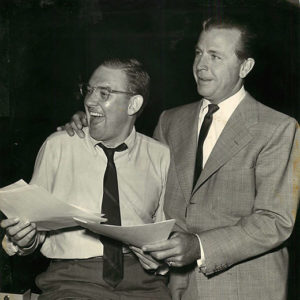 Bill Froug and Dick Powell
Bill Froug and Dick Powell 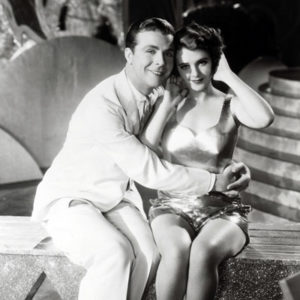 Gold Diggers of 1933
Gold Diggers of 1933 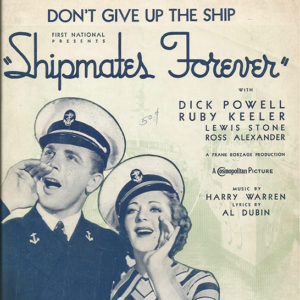 Dick Powell Music
Dick Powell Music 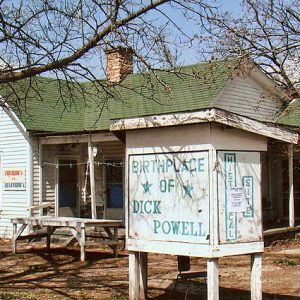 Dick Powell Home
Dick Powell Home 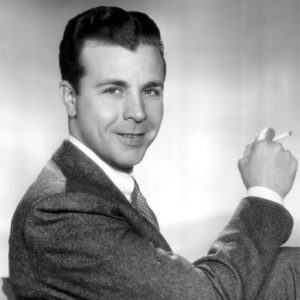 Dick Powell
Dick Powell 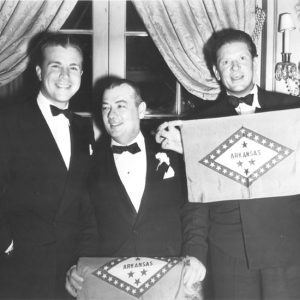 Powell, Hall, and Burns
Powell, Hall, and Burns  The Singing Marine Sheet Music Featuring Dick Powell
The Singing Marine Sheet Music Featuring Dick Powell 




Comments
No comments on this entry yet.